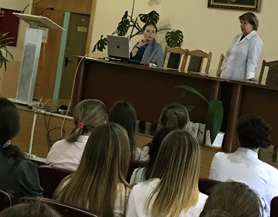How to Increase Qualification in the Healthcare Industry: Courses and Webinars
The healthcare sector is considered overwhelming when it comes to learning and becoming a professional. Most specialties require six years of study at university. Additionally, you have to get some practical experience to know how the chosen healthcare subsector works. The internship is extremely popular as it allows students to work with real patients and interact with future colleagues.
However, universities, medical schools, and internship programs are not the only source of knowledge in healthcare. The modern world opens up new opportunities: useful, convenient, and simple online educational courses.
The general impact of training programs

Let’s start with the most traditional type of education. Obviously, university courses are the most comprehensive and full-scale ones, so we suggest taking them for all students who want to study healthcare.
All-encompassing programs at universities and medical schools may require a lot of time, money, and perseverance but they award real scientific degrees and diplomas. Explore the US programs and European universities to find out which of them suits your needs best. As well, you can check the overall list of healthcare degrees.
For those who have already graduated from university or simply don’t want to spend six years, there are online platforms. Their efficiency is generally lower than the impact of offline schools and internships because they are focused on specific fields. Nevertheless, online courses and webinars are highly useful in two cases:
- To learn about the industry or specialty. It’s helpful for school graduates or first-year students who want to fix upon the desirable profession in the healthcare sector. Thus, online education serves as career guidance for newbies.
- To deepen your knowledge. As well, in-depth courses and webinars help professionals to improve their qualification. Usually, such programs are premium as they are akin to refresher courses and training.
The combination of traditional education, internship, regular online and offline courses can boost your qualification and provide additional experience. However, web-based learning is generally tailored to students, so let’s look at them.
Modern ways to increase your qualification
With the rise of the Internet, various educational websites and platforms popped up. New technologies like high-quality online broadcasts from any place on the Earth significantly improve the efficiency of web-based education.
Most likely, you’ve heard about Coursera or edX – websites which deliver massive open online courses (MOOCs). They provide free and accessible for all education with valid certificates. On a par with MOOCs, there are webinars – online conferences and presentations which are hosted by separate platforms of various organizations.
Further, we will focus on both courses and seminars dedicated to the healthcare industry.
1. Online courses
 MOOCs are pretty popular now as there are several global platforms which provide free educational lessons with images, videos, and even interactive elements. Usually, courses are available via three types of platforms:
MOOCs are pretty popular now as there are several global platforms which provide free educational lessons with images, videos, and even interactive elements. Usually, courses are available via three types of platforms:
- Websites of universities/schools. Big names in traditional education like Harvard, MIT, and Johns Hopkins University have distance learning departments and offer different courses. You can even complete a full six-year program remotely.
- Aggregators of MOOCs. Similarly, the likes of Coursera, edX, and Universal Class list dozens of introductory and advanced lectures. Often, they cooperate with universities to engage famous tutors.
- Governmental, social and charity platforms. A lot of national departments and NGOs focus on the healthcare industry. Global Health eLearning Center, Public Health Agency of Canada, and even the World Health Organization provide free courses.
For the wider selection of courses, check the MPH Programs List which features all of the listed categories.
As well, online courses are divided into free and paid versions. Basic MOOCs are totally free but they feature premium options like certificates which are as relevant as university diplomas. Other courses are fee-based but they are more detailed and also may grant you study credits (like ones featured in ECTS).
2. Webinars
Online seminars and presentations are more specific. While MOOCs cover fundamentals and provide so-called 101 programs (introductions to certain fields), webinars come with detailed stuff. Similarly to courses, they may be designed for newcomers or professionals.
 As for exact topics, webinars are often dedicated to innovations in the healthcare industry, so you can find titles like Augmented Intelligence or Data Sharing.
As for exact topics, webinars are often dedicated to innovations in the healthcare industry, so you can find titles like Augmented Intelligence or Data Sharing.
Manufacturers which produce medical devices and equipment also host webinars focused on modern technologies and gadgets (check Dräger programs, for example). Finally, there are platforms like StuderGroup which hold webinars for employees who want to develop their professional and social skills.
Technically, online presentations may be available during a broadcasting period only. Most of them are free but they rarely award diplomas or certificates.
The most effective approaches
As we have mentioned earlier, university education is of high priority. When combined with online education, it can increase the efficiency of the study significantly. MOOCs and webinars reduce the cost of education and training time, facilitate engagement of employees and students, and allow quick updating which is extremely important in the evolving world.